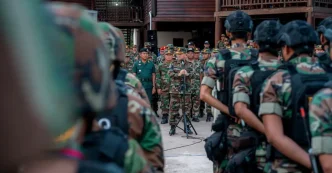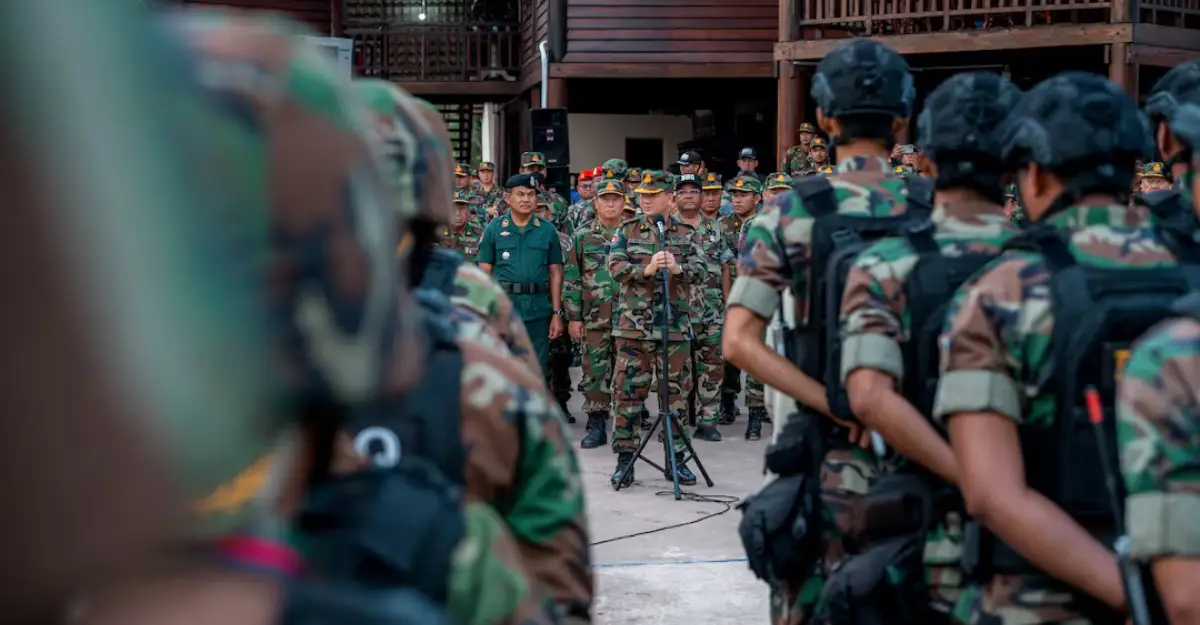Thailand has accused Cambodia of amassing troops and heavy weaponry along their shared border, raising concerns about escalating tensions in a region long marked by territorial disputes. The Thai military’s claims, made public earlier this week, come amid ongoing legal proceedings at the International Court of Justice (ICJ) over contested border areas, further complicating bilateral relations between the two South East Asian neighbors.
Thai Military Sounds Alarm
The Royal Thai Army issued a statement alleging that Cambodia has deployed significant military forces, including artillery and armored vehicles, near disputed sections of the border in Thailand’s Surin and Si Sa Ket provinces. Thai military spokesperson Colonel Somsak Nilbanjerdkul stated, “We have observed an unusual build-up of Cambodian forces and equipment in areas close to the disputed zones” as reported by Asia News Network. While no direct confrontations have been reported, Thai authorities have placed border units on high alert and intensified patrols to monitor the situation.
Thailand’s concerns are rooted in a history of intermittent skirmishes over border territories, particularly around the Preah Vihear temple, a UNESCO World Heritage site claimed by both nations. A 1962 ICJ ruling awarded the temple to Cambodia, but disagreements over surrounding land persist, fueling periodic clashes. The Thai government has urged Cambodia to clarify its intentions and adhere to bilateral agreements aimed at maintaining peace along the frontier.
Cambodia’s Strategic Moves at the ICJ
Adding to the complexity, Cambodia recently held its inaugural commission meeting to strategize for the ongoing ICJ border dispute case with Thailand. According to reports from Asia News Network, the meeting focused on reinforcing Cambodia’s legal arguments to secure international recognition of its territorial claims. Cambodian officials emphasized their commitment to a peaceful resolution through legal channels, though they have yet to publicly respond to Thailand’s latest allegations of troop movements.
The Cambodian government’s push for a definitive ICJ ruling reflects a broader strategy to resolve historical grievances while strengthening its position in regional diplomacy. Analysts suggest that Cambodia may be bolstering its military presence as a precautionary measure or to signal resolve during the legal proceedings. However, without official confirmation, such interpretations remain speculative, and no evidence currently points to imminent hostility.
Historical Context of a Fractured Border
The Thai-Cambodian border dispute traces its origins to colonial-era treaties between France, which controlled Cambodia, and Siam, as Thailand was then known. Ambiguities in the demarcation of the 800-kilometer border have led to overlapping claims, with both nations citing historical and cultural ties to contested areas. The Preah Vihear temple, perched on a cliff in the Dangrek Mountains, remains a flashpoint, symbolizing national pride for both countries.
Past conflicts, including deadly clashes in 2008 and 2011, have claimed dozens of lives and displaced thousands of civilians on both sides. These incidents prompted international mediation efforts, including interventions by the Association of Southeast Asian Nations (ASEAN), though lasting solutions have remained elusive. The current ICJ case, initiated by Cambodia to clarify ownership of disputed territories, is seen as a critical step toward preventing future violence, provided both parties respect the court’s eventual ruling.
Regional and International Implications
The alleged troop build-up and the ongoing legal battle carry significant implications for South East Asia, a region striving for stability amid broader geopolitical challenges. Thailand and Cambodia are both key members of ASEAN, an organization that prioritizes non-interference and peaceful dispute resolution among its members. Any escalation could undermine ASEAN’s credibility and strain diplomatic ties within the bloc.
Moreover, the border tensions occur against the backdrop of China’s growing influence in the region. Cambodia, a close ally of Beijing, has benefited from Chinese investment and military cooperation, raising questions about external involvement in the dispute. Thailand, while maintaining a balanced foreign policy, has expressed concerns over foreign powers exacerbating regional conflicts. Analysts caution that if the situation deteriorates, it could draw unwanted attention from major powers, further complicating resolution efforts.
Public Sentiment and Economic Impact
On the ground, the renewed tensions have sparked anxiety among border communities in both countries. Residents of Thailand’s Si Sa Ket province, many of whom rely on cross-border trade with Cambodia, fear that military posturing could disrupt their livelihoods. “We just want peace so we can keep working and trading” said a local Thai merchant, as quoted by Asia News Network. Similar sentiments echo in Cambodian villages near the border, where memories of past conflicts remain fresh.
Economically, the border region is a vital conduit for goods and labor, with annual trade between the two nations valued at approximately 9 billion Thai Baht (US$252 million, based on exchange rates as of May 24, 2025). A prolonged standoff could lead to border closures, impacting markets for agricultural products, consumer goods, and tourism. Both governments have previously committed to keeping trade routes open during disputes, but the current uncertainty casts doubt on those assurances.
Calls for Dialogue and De-escalation
Amid the rising rhetoric, regional observers and diplomats have called for restraint and renewed dialogue. The ASEAN Secretariat has reiterated its support for peaceful negotiations, urging Thailand and Cambodia to utilize existing bilateral mechanisms, such as the Joint Boundary Commission, to address immediate concerns. Independent experts suggest that confidence-building measures, including joint military patrols and transparent communication, could help reduce misunderstandings.
Thailand’s Foreign Ministry has signaled its willingness to engage in talks, though it insists that Cambodia must first provide clarity on its military activities. Cambodian authorities, meanwhile, have emphasized their focus on the ICJ process, potentially viewing direct negotiations as secondary to a legal resolution. This divergence in approach underscores the challenges of achieving a swift détente.
Looking Ahead: A Fragile Balance
As Thailand and Cambodia navigate this latest chapter in their fraught relationship, the risk of miscalculation looms large. While neither side has indicated an intent to engage in hostilities, the presence of troops and heavy weaponry near disputed areas heightens the potential for unintended escalation. The international community, particularly ASEAN, faces a critical test in facilitating dialogue and preventing a slide into conflict.
For now, the border remains a tense frontier, with the outcome of the ICJ case likely to shape the future of Thai-Cambodian relations. As legal arguments unfold in The Hague and military forces stand watch in the Dangrek Mountains, the question remains whether diplomacy can prevail over historical grievances and nationalist fervor. Border communities, caught in the crosshairs, can only hope for a resolution that prioritizes peace over pride.















